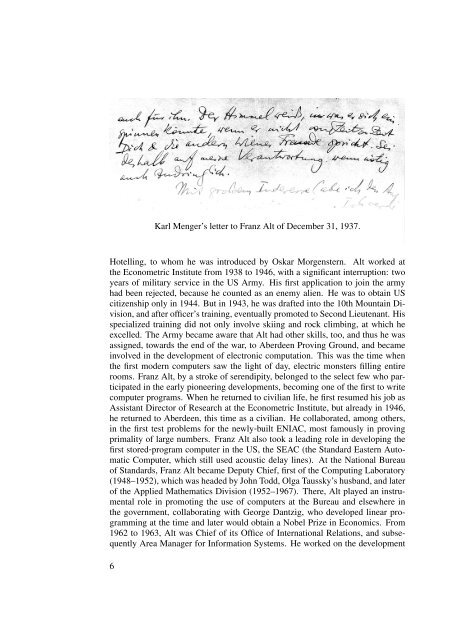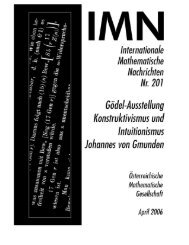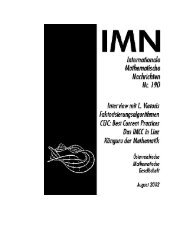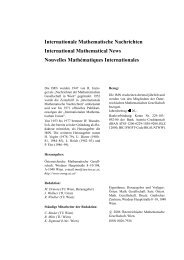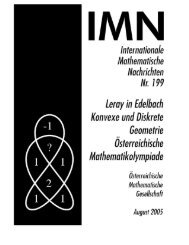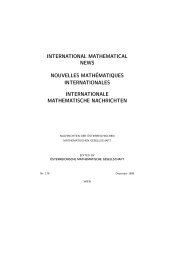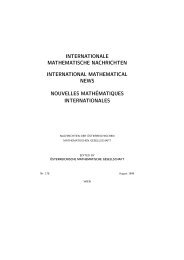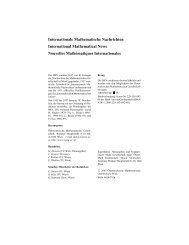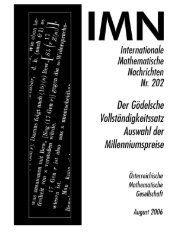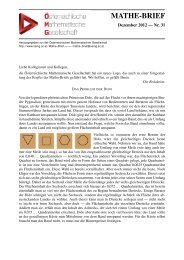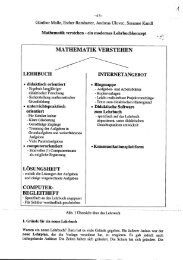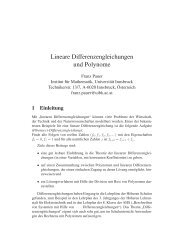218 - Ãsterreichische Mathematische Gesellschaft
218 - Ãsterreichische Mathematische Gesellschaft
218 - Ãsterreichische Mathematische Gesellschaft
Erfolgreiche ePaper selbst erstellen
Machen Sie aus Ihren PDF Publikationen ein blätterbares Flipbook mit unserer einzigartigen Google optimierten e-Paper Software.
Karl Menger’s letter to Franz Alt of December 31, 1937.<br />
Hotelling, to whom he was introduced by Oskar Morgenstern. Alt worked at<br />
the Econometric Institute from 1938 to 1946, with a significant interruption: two<br />
years of military service in the US Army. His first application to join the army<br />
had been rejected, because he counted as an enemy alien. He was to obtain US<br />
citizenship only in 1944. But in 1943, he was drafted into the 10th Mountain Division,<br />
and after officer’s training, eventually promoted to Second Lieutenant. His<br />
specialized training did not only involve skiing and rock climbing, at which he<br />
excelled. The Army became aware that Alt had other skills, too, and thus he was<br />
assigned, towards the end of the war, to Aberdeen Proving Ground, and became<br />
involved in the development of electronic computation. This was the time when<br />
the first modern computers saw the light of day, electric monsters filling entire<br />
rooms. Franz Alt, by a stroke of serendipity, belonged to the select few who participated<br />
in the early pioneering developments, becoming one of the first to write<br />
computer programs. When he returned to civilian life, he first resumed his job as<br />
Assistant Director of Research at the Econometric Institute, but already in 1946,<br />
he returned to Aberdeen, this time as a civilian. He collaborated, among others,<br />
in the first test problems for the newly-built ENIAC, most famously in proving<br />
primality of large numbers. Franz Alt also took a leading role in developing the<br />
first stored-program computer in the US, the SEAC (the Standard Eastern Automatic<br />
Computer, which still used acoustic delay lines). At the National Bureau<br />
of Standards, Franz Alt became Deputy Chief, first of the Computing Laboratory<br />
(1948–1952), which was headed by John Todd, Olga Taussky’s husband, and later<br />
of the Applied Mathematics Division (1952–1967). There, Alt played an instrumental<br />
role in promoting the use of computers at the Bureau and elsewhere in<br />
the government, collaborating with George Dantzig, who developed linear programming<br />
at the time and later would obtain a Nobel Prize in Economics. From<br />
1962 to 1963, Alt was Chief of its Office of International Relations, and subsequently<br />
Area Manager for Information Systems. He worked on the development<br />
6


